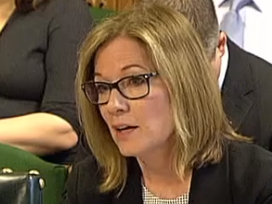
The UK’s Information Commissioner has told MPs a levy on social media platforms would be a “fine idea” and said the time for self-regulation of the internet is over, suggesting a “hybrid” regulator could fulfil the role.
Elizabeth Denham called for a statutory code of practice as part of “internet harms regulation” and another for organisations involved in political campaigning.
She suggested there could be a hybrid regulator to look at content and conduct online with extraterritorial reach and powers of “serious sanction”, similar to the Information Commissioner’s Office.
The ICO yesterday published the results of its investigation into the use of data analytics in political campaigns, which began in spring 2017 after the Observer alleged data company Cambridge Analytica had improperly harvested millions of Facebook users’ data during the EU Referendum.
The ICO investigation found “significant issues, negligence and contraventions of the law” and issued fines totalling £135,000 to campaign group Leave.EU and donor Arron Banks’s company Eldon Insurance.
Denham (pictured) said a tech levy would be a “good way for companies to pay for digital literacy” and education about disinformation (or “fake news”) and other harmful internet content.
“Ultimately a tech levy and how it funds various regulators is one for Government and Parliament but I do think there is merit in the companies paying for some of the changes we need in the environment,” Denham told a Digital, Culture, Media and Sport Select Committee hearing.
She added that social media platforms have a “huge responsibility” to put systems in place to identify disinformation, bots and fake accounts, but that these should be kept in check by an internet regulator.
She said: “…I think you need a regulator that is a backstop to ensure that the companies have the right systems and that the systems are effective in identifying and taking down disinformation.”
The ICO report said a self-regulatory approach to data protection laws “will not guarantee consistency, rigour or public confidence”.
Denham suggested a “hybrid model” between the ICO and broadcast regulator Ofcom could fulfil the function of “dealing with some of these internet harms – disinformation, misinformation, taking down harmful and offensive user-generated content”.
She added that the concept of internet regulation was a “very complex area” which has not yet been tackled by any country.
In Germany tough new legislation came into effect in January requiring social media companies to remove “obviously illegal” extreme content and hate speech from their platforms within 24 hours or face fines up to €50m.
Denham said: “Germany’s law is a step, but it’s quite controversial and the need to balance freedom of expression with internet harms is very challenging for policymakers.
“I think it’s challenging, but the ICO has a lot of experience in regulating these large platforms. We’ve had years of experience in right to be forgotten cases where there’s de-linking and balancing privacy rights with freedom of speech, freedom of expression.”
In a statement, DCMS Committee chairman Damian Collins welcomed Denham’s comments that Facebook “needs to change and take much greater responsibility” and that it should be subject to “stricter regulation and oversight”.
Collins added: “My committee has called for a tech levy on companies to pay for digital literacy and education – I’m encouraged to hear her endorse this as a ‘fine idea’.
“Looking to the future, we hear loudly the opinion of the Information Commissioner that the time for self-regulation is over and a time of accountability is here where Parliament sets the objectives and outcomes for social media companies to follow, rather than the regulator taking on individual complaints.”
Electoral Commission chief executive Claire Bassett, who also appeared in front of the DCMS Committee yesterday, told MPs she welcomed the progress that Facebook has made after it began forcing UK political ad buyers to verify their identity and location.
But she added: “We remain concerned that we need all of the different social media platforms to be engaged and not just some of them and that probably will need further regulation.”
“We are very open to being part of any policy discussions around this about developing measures and things that can be done there,” Bassett went on.
“But we need to do it in a way that balances freedom of speech and protection of data and that side of it, and make sure that it doesn’t create burdens which actually inhibit people who have a right to say things.”
Picture: Parliament TV
Email pged@pressgazette.co.uk to point out mistakes, provide story tips or send in a letter for publication on our "Letters Page" blog
